This piece is part of the Center for Middle East Policy’s Israel-Gaza interviews series, in which leading experts unpack the conflict via in-depth Q&As.
Hezbollah's role in Lebanon
KEVIN HUGGARD:
What role does Hezbollah play in the Lebanese political system?
JEFFREY FELTMAN:
By virtue of its arms (and its willingness to use them against other Lebanese, as demonstrated most vividly in street battles in 2009) and its political base, which is rooted in Lebanon’s historically marginalized Shia population, Hezbollah is the most powerful political force inside Lebanon. Politically, it operates under an arrogant double standard: Hezbollah rejects public oversight into its decisionmaking — including life-and-death questions over whether to drag Lebanon into war — while insisting on the right to veto any government decision it opposes, ranging from customs inspections to cabinet appointments. Hezbollah courts Lebanese political figures from other religious groups, such as former Foreign Minister (and presidential aspirant) Gebran Bassil, to posture as a national movement and mask its reality as an Iranian asset holding Lebanon hostage to its interests.
With the chronic failure of the Lebanese government to provide national services, Hezbollah has also established alternative social support networks for its supporters, funded largely by revenues from criminal networks abroad and extortion at home. Hezbollah’s parallel institutions (clinics, schools, banks, even gas stations, etc.) have largely insulated its followers from Lebanon’s 2019 financial collapse that has impoverished other groups. Hezbollah has used its parliamentary weight and Lebanon’s sectarian spoils system, combined with veiled threats of violence, to block the election of a president (with the office now vacant since October 2022) and prevent a fully-empowered cabinet from taking office to deal with Lebanon’s economic meltdown and other problems. Often described as a “state within a state,” Hezbollah is more accurately seen as a state within a non-state.
Hezbollah's relationship with Iran
KEVIN HUGGARD:
Could you outline the relationship between Hezbollah and Iran? To what extent should we understand it as a Lebanese actor with parochial interests or, instead, as an Iranian proxy?
JEFFREY FELTMAN:
Hezbollah is the Islamic Republic of Iran’s most successful — and most lethal — export. Iran’s Islamic Revolutionary Guard Corps exploited the chaos of Lebanon’s civil war and especially the 1982 Israeli invasion of Lebanon to seed the forces that matured into Hezbollah. Given the historic Maronite and Sunni Lebanese elite’s neglect of Lebanon’s sizable Shia population and the degradations the Shia community faced from the Israeli invasion, Hezbollah attracted (and maintains) genuine local Shia support, reinforced with salaries and social services.
Today, Hezbollah is no longer merely a subsidiary or proxy of Iran but rather an almost equal partner, serving as Iran’s vanguard in Syria, Iraq, and Yemen, while training local militias and terrorist groups. The conviction of three Hezbollah fighters by a U.N.-backed tribunal for the 2005 murder of former Lebanese Prime Minister Rafik Hariri also demonstrates Hezbollah’s role as guns-for-hire assassins for Syria and Iran.
Without question, Hezbollah plays a starring role on the Lebanese political stage. The constant quarrels and divisions among other Lebanese political movements undercut any domestic Lebanese attempt to contain Hezbollah. With Lebanese public resentment of Hezbollah’s arms and privileges growing, Hezbollah is also reluctant to further erode its domestic credibility by launching a war at the same time rates of poverty are soaring in what had been a middle-income country, in the aftermath of Lebanon’s 2019 financial meltdown. But Hezbollah’s Lebanese role is secondary to its ties with Iran. Hezbollah’s massive arsenal has little to do with Lebanon and serves primarily as Iran’s deterrence against Israel. If Hezbollah ever has to choose between Iran and Lebanon, Lebanon becomes roadkill.
Hezbollah's relationship with Hamas
KEVIN HUGGARD:
What relationship does Hezbollah have with Hamas?
JEFFREY FELTMAN:
Hezbollah and Hamas have different roots: Hezbollah’s origins stem from the Iranian revolution and it draws its strength from Lebanon’s Shia population, whereas Hamas is an outgrowth of the Muslim Brotherhood, with Palestinian Muslims being overwhelmingly Sunni. That would theoretically put the two groups on opposite sides of the Sunni-Shia divide. However, the two terrorist movements have found common ground under the Iranian “Axis of Resistance” moniker, bonding in an anti-Israeli, anti-American, anti-Western coalition. Iran’s money, training, smuggled arms, and its supreme leader’s obsessive paranoia about the United States solidify this “axis” partnership of Hezbollah and Hamas. In the aftermath of Hamas’ October 7 savagery in Israel, international media have highlighted recent meetings in Beirut of Iranian, Hezbollah, and Hamas representatives, suggesting close cooperation (even if, as Hezbollah Secretary-General Hassan Nasrallah claims, Hezbollah was unaware of the specifics of the October 7 massacre). Add to this the Houthis in Yemen, Bashar al-Assad’s Syria, and Iran-aligned militias in Iraq, and you can map out Iran’s deadly assets in the region.
Looking to past wars between Israel and Hezbollah
KEVIN HUGGARD:
How might the experience of past wars between Israel and Hezbollah or other Lebanese groups be informing each side’s calculations?
JEFFREY FELTMAN:
The 2006 war between Israel and Hezbollah is illustrative. In July 2006, in a sophisticated operation, Hezbollah operatives penetrated northern Israel and abducted Israeli soldiers. This triggered a 34-day war in which about 1,200 Lebanese and 165 Israelis were killed. Nearly half a million Israelis and about a million Lebanese — largely Shia, Hezbollah’s constituency — were displaced. Beirut’s southern suburbs (Hezbollah’s political and demographic stronghold) and much Lebanese civilian infrastructure were devastated, and Lebanon’s summer tourism season — a much-needed source of money and employment — was destroyed. Later, Nasrallah acknowledged that, had he known of the ferocious Israeli response, he would not have greenlighted the abduction operation.
This tells us that Nasrallah and the Israelis both know first-hand that Hezbollah can misread Israeli redlines, with awful consequences for Lebanon and Israel alike. Hezbollah and Israel are also aware that an Israel-Hezbollah war today would be far more destructive than in 2006, given increased military capabilities on each side.
Hezbollah's and Israel's incentives to escalate or not
KEVIN HUGGARD:
How do you understand the incentives Hezbollah and Israel face in deciding whether or not to escalate their conflict? Does the extremely challenging economic and political environment in Lebanon shape Hezbollah’s calculus?
JEFFREY FELTMAN:
Hezbollah has massively expanded its arsenal and the sophistication of its weaponry since the 2006 war. The irreducible purpose of Hezbollah’s estimated 150,000 rockets is to deter Israel from a massive attack on Iran — or to retaliate for a massive Israeli attack on Iran. For all its rhetorical support of Palestinians under Israeli occupation, will Hezbollah and Iran want to employ these weapons on behalf of the Palestinian cause? Moreover, at this juncture, the international narrative in much of the world works in Hezbollah and Iran’s favor: horror and anger over the civilian toll in Gaza transcend the initial outrage and sympathy over the October 7 butchery and abduction of Israelis. Hezbollah and Iran take much satisfaction with Israel being branded the aggressor and may not want to complicate that impression.
My guess is that Hezbollah will, at least for now, try to maintain the pressure through a steady drumbeat of rocket and missile attacks in Israel’s north, while avoiding massive civilian casualties that would trigger large-scale Israeli retaliation. A full-scale war would deplete Hezbollah’s arsenal (both from launching attacks on Israel and from Israeli attacks on Hezbollah’s weapons stocks), eliminating its utility as Iran’s deterrence.
With tens of thousands of Israeli civilians evacuated from communities near the border with Lebanon, Hezbollah can already claim a significant accomplishment while keeping its arsenal largely intact. Israel seems to be responding in kind, keeping pressure on Hezbollah without posing what Hezbollah or Iran would see as an existential threat, with Lebanese civilians fleeing their border villages. Casualties on both sides are rising, but manageable in numbers compared to the 1,200 Israelis murdered on October 7 and the estimated 11,000 (and rising) Palestinians killed in Gaza.
But, as we saw in the 2006 war, redlines can be misunderstood. In its attempts to show solidarity with the Palestinians, Hezbollah may miscalculate. (Considering many Lebanese pin the blame of their 1975-1990 civil war on the Palestinians rather than hold a mirror to their own faces, Hezbollah may face less pro-Palestinian sentiments in Lebanon compared to other Arab countries, somewhat reducing the pressure for a full-scale war.) And will the Israelis tolerate continued attacks in the north or feel compelled to take preventive action that could precipitate war?
Another consideration is the importance of Hamas to Iran. If Israel appears successful in degrading Hamas’ military capacity and decapitating its leadership, will Iran interpret that as a significantly existential threat to order Hezbollah to go all the way?
In short, the risks of a full-scale Israel-Lebanon war, which both sides currently seem determined to avoid, are extremely high.
Making sense of Nasrallah's wartime addresses
KEVIN HUGGARD:
Nasrallah has given two speeches since the start of this war. What is your read of what he has tried to communicate with these addresses?
JEFFREY FELTMAN:
Just as Nasrallah tries to position Hezbollah both as an important force inside the Lebanese constitutional system (when that suits him) and as a “resistance force” impervious to Lebanese public oversight (when that privileges Hezbollah), he is playing a double game with his speeches. Essentially, he is trying to have his cake and eat it, too. His speeches are full of language about heroic “resistance” and solidarity with the Palestinian cause, vowing that Hezbollah is part of the fight. At the same time, he has tried to distinguish that solidarity from any responsibility for the planning and execution of Hamas’ October 7 attack, perhaps in hopes of removing a rationale for Israeli strikes against Hezbollah and Iran. His speeches are also full of what to the Lebanese ears are probably both reassuring and alarming words: reassuring in that he has not signaled an intention for Hezbollah to unleash its arsenal on Israel (which would obviously invite massive Israeli retaliation and enormous Lebanese suffering) and alarming in that he maintains that option remains open.
The Biden administration's efforts in the conflict
KEVIN HUGGARD:
Have the Biden administration’s efforts to deter a broader conflict been successful in changing Hezbollah’s incentives regarding escalation?
JEFFREY FELTMAN:
Let’s be clear: the violence has already expanded beyond Israel-Gaza, with attacks from Lebanon, in Syria, in Iraq, and even from the Houthis in Yemen. So far, this escalation has not caused massive casualties or provoked continued fighting. But this could change at any moment. The Biden administration has deployed assets (two carrier strike groups, weapons deliveries to Israel) and used available channels in the region and beyond to send warnings to Iran, in addition to striking Iranian assets in Syria and Iraq. The United States does not talk directly with Hezbollah, categorized as a terrorist organization. But the U.S. Embassy in Beirut has plenty of “Hezbollah-adjacent” contacts able to reinforce warnings. Hezbollah has surely received the message and takes into account that war against Israel will bring U.S. military might into play.
The Brookings Institution is committed to quality, independence, and impact.
We are supported by a diverse array of funders. In line with our values and policies, each Brookings publication represents the sole views of its author(s).

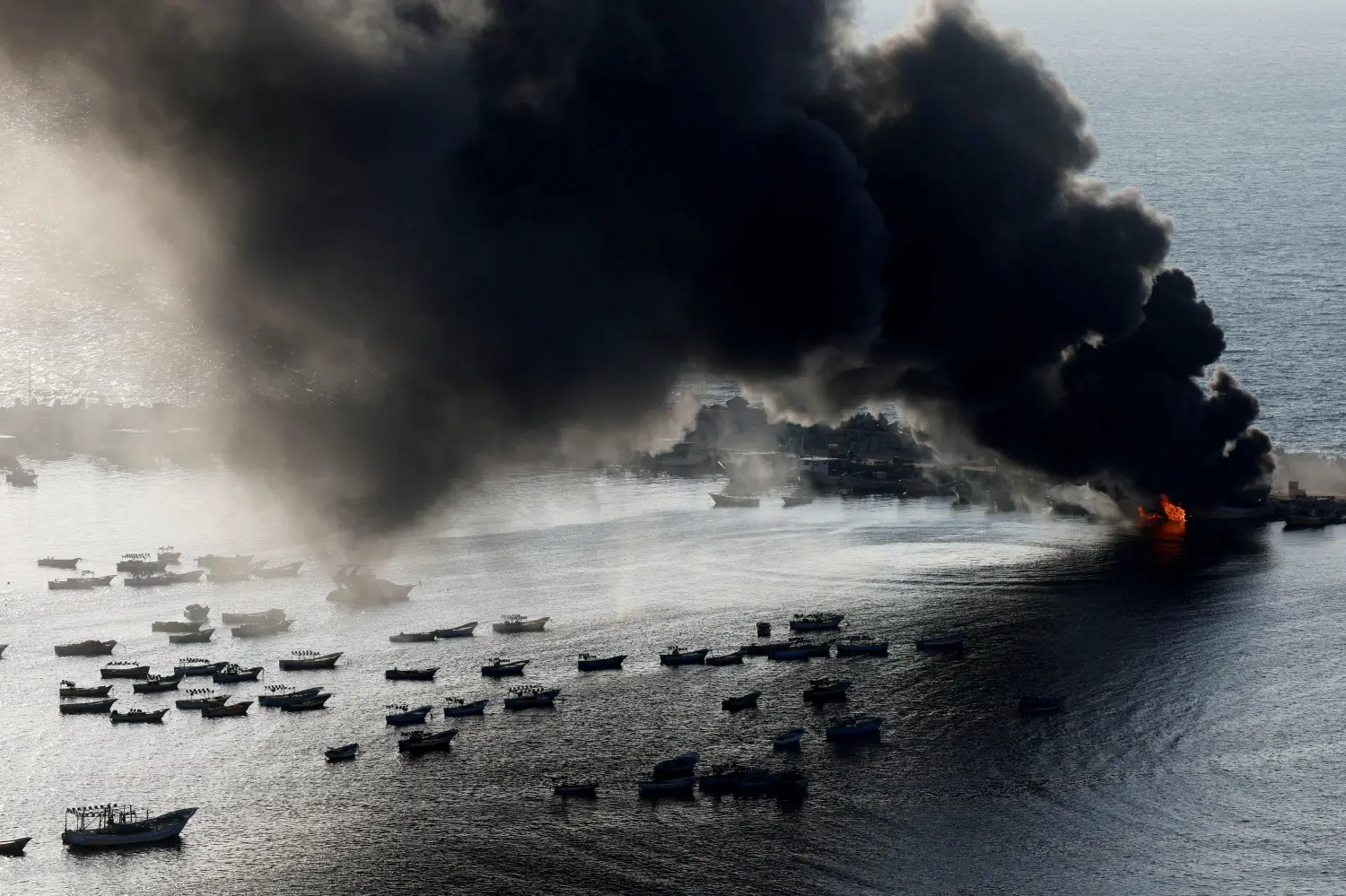

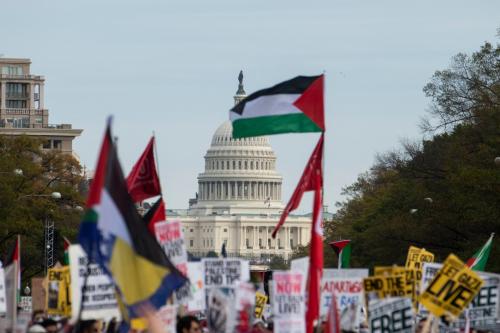
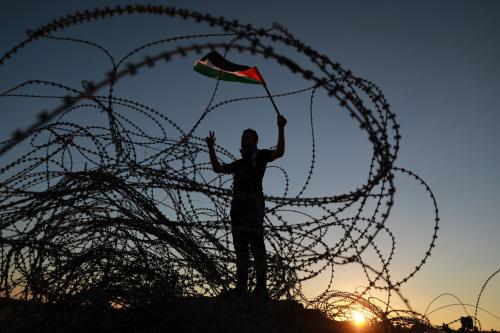
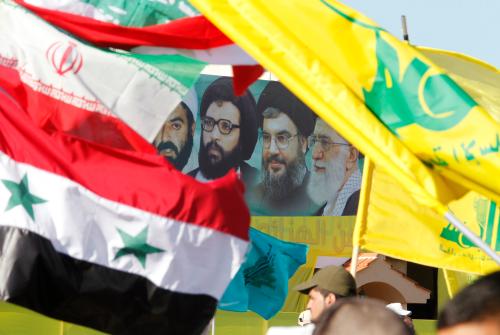
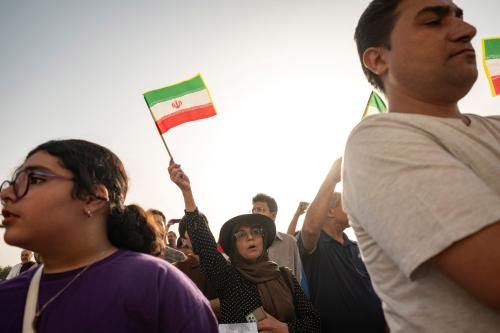


Commentary
On Hezbollah, Lebanon, and the risk of escalation
Ask the expert
November 17, 2023